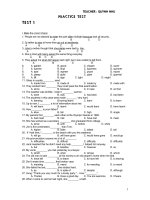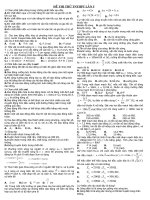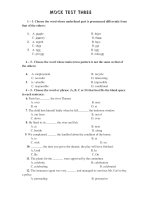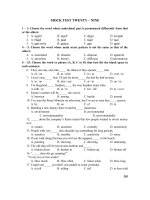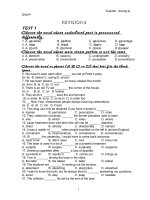Ôn Thi TNPT 14 &15
Bạn đang xem bản rút gọn của tài liệu. Xem và tải ngay bản đầy đủ của tài liệu tại đây (128.52 KB, 6 trang )
ÔN LUYỆN KIẾN THỨC THI TNPT – 2009
PRACTICE TEST 14
(April 15
th
, 2009)
Questions 1-3: Choose one word (by circling the responding letter A, B, C or D), whose underlined part is
pronounced differently from the rest in each group.
1. A. cheerful B. charity C. machine D. chance
2. A. field B. belief C. brief D. friend
3. A. between B. cheese C. sheep D. cheer
Questions 4-5: Choose and circle one option A, B, C or D corresponding to the word whose main stress is on the
syllable in the position which is different from that of the others
4. A. between B. cherish C. chicken D. kitchen
5. A. exciting B. charity C. convenient D. surprising
Questions 6-30: These are incomplete sentences. Choose and circle the corresponding A, B, C or D as the best
choice to complete each sentence.
6. Never in my life.........such a beautiful sunset.
A. I have seen B. I do see C. have I seen D. do I see
7.1 will phone you.........I get there.
A. as well as B. as much as C. as soon as D. as early as
8. If we heat water to 100 degrees Celsius, it..........
A. would boil B. will be boiling C. is boiling D. boils
9. After finishing the presentation, I suggested.........to the cinema.
A. us to go B. that we to go C. going D. we going
10. If you do not learn seriously,.........to understand the subject well.
A. you will never be able B. will you never be able
C. never you will be able D. will never you be able
11. Early carpenters, having.........nails, had to use wooden pegs to secure their constructions.
A. not B. neither C. no D. none
12. Not.........1975 did we liberate the South.
A. since B. for C. until D. as
13. People who reverse the letters of words.........to read suffer from dyslexia. [thông manh]
A. when trying B. if they tried C. when tried D. if they try
14. Featured at the Henry Ford Museum.........of antique cars dating from 1865.
A. is an exhibit B. an exhibit C. are an exhibit D. an exhibit is
15. The purpose of a labor union is to improve the working conditions and .........its members.
A. protecting B. to protect C. in protection D. for protection
16. We cannot imagine.........life would be like without music.
A. what B. when C. where D. how
17. I do believe that his study there will be.........great benefit to his teaching career later.
A. on B. to C. in D. of
18. The formal statement of this process is.........the principle of natural selection.
A. referred B. called C. known D. regarded
19. What.........is protecting the area and these endangered species.
A. in environmentalists are interested B. are environmentalists interested in
C. are interested in environmentalists D. environmentalists are interested in
20.."What's wrong with you today? Did you get out of bed on the wrong
A. end B. edge C. foot D. side
21..From these and.........observations, Darwin put together a concept of natural selection.
A. another B. other C. others D. other's
22. A serious study of physics is impossible without.........knowledge of mathematics.
A. several B. amount of C. some D. few
23. Hardly.........play truant. Something must have happened to them.
A. do they B. they do C. have they D. they have
24. It's very cold in here, do you mind.........I close the window?
A. whether B. as if C. if D. for
25. If you had asked him, he.........helped you to solve the problem.
A. will have B. ought to have C. should have D. would have
26. Sidney always gets high marks because her compositions are..........
A. well extremely written B. extremely well written C. written well extremely D. well written extremely
27. "Whose book is it?" - "I don't know, but I think.........."
A. it is Jim B. it is Jim's C. it is belonging to Jim D. it belongs to Jim's
28. We.........for an hour when the bus finally came.
A. waited B. have waited C. have been waiting D. had been waiting
29.........., Mark, is attending the lecture now.
A. Right now B. At that time C. Because of the time D. My friend
30. The tetracyclines,.........antibiotics, are used to treat infections.
A. are a family of B. being a family C. a family of D. their family is
Questions 31 - 35: Read the following passage carefully and then choose the best option (A, B, C, or D) to fit
each space.
A friend of mine has just come back from her holiday in Australia. She's telling us about her holiday there. Here is
her description of this fantastic place.
"We arrived at Sydney airport really early in the morning. The view from the (31).........Sydney harbor was fantastic.
We were really exhausted but we wanted to have (32).........around Sydney, so we went sightseeing
straight away. We went to the Opera House first. It's even more beautiful than in the photos - really (33).......... We
then went to the Rocks, which is the old section of Sydney and which is now very pretty, particularly at night. The
next morning we went on Harbor Cruise. On the following day we flew up to Cairns. The scenery was wonderful
there. We especially liked the Barrier Reef (34).........colorful fish and clear blue water. After that, we decided to go to
(35).........quiet. We flew to Seaford. We didn't see many tourists there. However, I love this place. There's so much
wildlife - a bird-watcher's dream!"
31. A. looking down over plane B. plane looking down over
C. plane down over looking D. over plane looking down
32. A. a look a bit of B. a bit look of a C. a bit of a look D. of a bit a look
33. A. spectator B. spectate C. spectacular D. spectacularly
34. A. with its B. for its C. together its D. like its
35. A. nowhere B. wherever C. everywhere D. somewhere
Questions 36 - 40: Read the following passage carefully and answer the questions that follow by circling letter A,
B, C or D as the correct answers.
Why are there so many grandmothers and so few grandfathers? In other words, why do men die younger than
women? Is it because men are afraid of getting old and helpless and so they prefer to die before that happens? Perhaps
they fear to be left alone by their women and so decide to do the leaving first.
Many explanations are given for the fact that men die earlier than women. Men are stronger physically, yet women
can hang on longer to life. Both men and women are emotional creatures but women are not afraid or ashamed to cry
while men refuse to do so. They are afraid of being thought "soft". Some men, when they are upset, play loud music
or dig in the garden to relieve their feelings. Many men like an orderly life so that they bury themselves in their work
or want a wife with some children or long to take part in wars where there is a definite chain of command. There is a
leader to give orders and a known enemy to fight against and defeat. All these make men feel they live in a rational
world.
So the majority of men like a rational world. Rationality is fine but it does not include everything that makes life
joyful and fun or even messy and frustrating. When a man refuses to cry he is refusing to accept that his emotions are
part of him. Of course some men do not follow this pattern. Bob Hawke is capable of crying in public whereas
Margaret Thatcher is probably incapable of crying at any time.
We need to cry because that shows our ability to suffer. If we do not suffer we are not really alive at all. Suffering
can be creative or destructive. If we can all learn to cry and laugh and shout and dance openly, we are living creatively
and adding something to the human race. We often say men suffer more from stress and therefore they die earlier. Are
we not saying in another way that they do not know how to suffer in the right way - with tears and laughter instead of
silence - and so they are miserable and just give up? That is just my theory of course. Have you a better one?
36. What does the word "that" (the underlined word) in the passage refer to?
A. The fact that men die younger than women B. The fact that they fear to be left alone
C. The fact that men get old and helpless D. The fact that they decide to do the leaving first
37. What is found the same for both men and women?
A. They like to cry B. They are physically strong
C. They want to play loud music D. They are emotional creatures
38. Which paragraph explains why men die earlier than women?
A. Paragraph 1 B. Paragraph 2 C. Paragraph 3 D. Paragraph 4
39. What's the writer's opinion toward crying?
A. It is a good thing for people to cry B. To be silent is better than to cry
C. It is all right for women to cry but shameful for men D. Tears are not real signs of suffering
40. What's the main question the article is intended to discuss?
A. Why men like a rational world B. Why women are more emotional than men
C. Why suffering is different in men and women D. Why men die earlier than women
Questions 41 - 45: Choose one option A, B, C or D corresponding to the sentence which has the same meaning
as the original one.
41. Most information was collected by direct observations of its behaviours.
A. Many direct observations have been made in its behaviours.
B. Almost the information was the result of direct observations of its behaviours.
C. Direct observations of its behaviours made for collecting most information.
D. Almost the information came from its behaviours for direct observations.
42. They try to prevent the reader from vocalizing.
A. They try to stop the reader from vocalizing. B. The reader tries to prevent vocalizing.
C. The reader tries to prevent them from vocalizing. D. They try to prevent vocalizing from the reader.
43. This passage focuses on helping students read faster.
A. How to read this passage faster and faster. B. Reading faster is the content of this passage.
C. The purpose of this passage is to help students read more quickly.
D. The purpose of this passage is to helping students read more quickly.
44. All of the students, but Peter went to the meeting.
A. Peter went to the meeting; and so did all of the students.
B. Except for Peter, all of the students went to the meeting.
C. All of the students, especially Peter went to the meeting.
D. All of the students, including Peter went to the meeting.
45. We take great pride in offering the best service in town.
A. Our service is the best. That's why people can see our pride.
B. We are very proud of offering the best service in town.
C. The best service in town is offered to people with great pride.
D. No one takes great pride in offering the best service in town, but we do.
Questions 46 - 50: In these sentences, each one has four underlined words or phrases marked A, B, C, and D.
Choose the one word or phrase which must be changed in order for the sentence to be correct by circling letter
A, B, C or D.
46. The jacket with three differently colors belongs to Hai, my brother.
A B C D
47. I often spend some money each month, about $50, to buy books on economics.
A B C D
48. She must have her reasons where she doesn't want to tell.
A B C D
49. Production is the process growing or making food, goods, or materials.
A B C D
50. As you can see, costs of living have been reduced for 20% over the past year.
A B C D
The End
PRACTICE TEST 15
Questions 1-2: Choose one option A, B, C or D corresponding to the word whose main stress is on the syllable in
the position which is different from that of the others.
1. A. penalty B. wildness C. reunite D. fascinating
2. A. unnoticed B. composed C. precision D. telescope
Questions 3-5: Choose one word (A, B, C or D ) whose underlined part is pronounced differently from the rest in
each group.
3. A. exactly B. exert C. exam D. excellent
4. A. invite B. shrine C. village D. primary
5. A. depends B. years C. temples D. parents
Questions 6 - 25: These are incomplete sentences. Choose A, B, C or D as your best choice to complete each
sentence.
6. Helen's parents were very pleased when they read her school..........
A. report B. papers C. diploma D. account
7. Truong has quite a good.........of physics.
A. capacity B. pass C. understanding D. head
8. In Britain, children start.........school at the age of five.
A. primary B. secondary C. nursery D. kindergarten
9. My favourite.........at school was history.
A. topic B. class C. theme D. subject
10. It's time for break. The bell has..........
A. gone B. struck C. rung D. sounded
11. Neither the students nor their lecturer......... English in the classroom.
A. uses B. use C. are using D. have used
12. Some people say that Sue is unfriendly, but she is always very nice .........me.
A.to B. of C. at D. on
13. They.........for more than five miles but they did not stop to rest.
A. were walking B. have walk C. had been walking D. have been walking
14. Her relatives didn't do anything to help her, and her friends..........
A. didn't neither B. didn't too C. didn't either D. did too
15. People who ……. crimes of violence should be punished.
A. make B. create C. commit D. cause
16. We can......... not only through words but also through body language.
A. talk B. transfer C. interpret D. communicate
17..........and interest are the two major factors that make you succeed in your work.
A. Friendliness B. Friendly C. Friendship D. Unfriendly
18. If John......... an alarm, the thieves wouldn't have broken into his house.
A. to install B. had installed C. have installed D. was installed
19. The 22
nd
SEA Games were well prepared and successfully ...........although it as the first time Vietnam hosted.
A. organization B. organize C. organized D. organizational
20. The spirit of the Asian Games have been.........over a long period of time, and passed from one Games to the next
spreading messages of unity, warmth, and friendship.
A. gone over B. put off C. looked for D. built up
21. Eating and living in this country is becoming.........expensive.
A. more and more B. too C. less D. so
22. He kept his job.........the manager had threatened to sack him.
A. despite B. unless C. even D. although
23. Many people used to think that women's.........are childbearing and home-taking.
A. abilities B. works C. roles D.task
24. Thoa: "I think women should not go to work." Vien: “I..........”
A. quite agree B. a little agreed C. so agree D. rather agreed
25. After a terrible argument with his boss, she handed in her..........
A. reservation B. reputation C. resignation D. responsibility
Questions 26 - 30: Read the following passage carefully and answer the questions that follow by circling letter A,
B, C or D as the correct answers.
"Where is the university?" is a question that many visitors to Cambridge ask, but no one can give them a clear
answer, for there is no wall to be found around the university. The university is the city. You can find the classroom
buildings, libraries, museums and offices of the university all over the city. And most of its members are the students
and teachers or professors of the thirty-one colleges.
Cambridge was already developing town long before the first students and teachers arrived 800 years ago. It grew
up by the river Granta, as the Cam was once called. A bridge was built over the river as early as 875.
In the fourteen and fifteen centuries more and more land was used for college buildings. The town grew much faster
in the nineteen century after the opening of the railway in 1845. Cambridge became a city in 1951 and now it has the
population of over 100,000. Many young students want to study at Cambridge. Thousands of people from all over the
world come to visit the university town. It has become a famous place all round the world.
26. Why do most visitors come to Cambridge?
A. To see the university B. To study in the colleges in Cambridge
C. To find the classroom buildings D. To use the libraries of the university
27. Around what time did the university begin to appear?
A. In the 8th century B. In the 13th century C. In the 9th century D. In the 15th century
28. Why did people name Cambridge the "City of Cambridge"?
A. Because the river was very well-known. B. Because there is a bridge over the Cam.
C. Because it was a developing town. D. Because there is a river named Granta.
29. After which year did the town really begin developing?
A. 800 B. 875 C. 1845 D. 1945
30. From what we read, we know that Cambridge is now.............
A. visited by international tourists B. a city without wall
C. a city of growing population D. a city that may have a wall around it
Questions 31 - 40: Read the following passage carefully and then choose the best option (A, B, C, or D) to fit
each space.
There is no one who has not heard of Walt Disney: He is without doubt one of the most famous singers in the
twentieth century and (31).........most people know hardly anything about him. (32).........he became one of the most
successful men in history, he left school at the age of sixteen and then studied art for a short time. By the (33).........
years of this century, he had already started to produce cartoons in Hollywood in (34) ......with his brother Roy, who,
for some reasons, never (35) ……to become as famous as Walt Disney is perhaps most well known on account of his
lovable cartoons character. Mickey Mouse, who first (36).........in 1928 in a film called "Steamboat Willie". One of the
most (37).........cartoon films of all time is "Snow White and the Seven Dwarfs", which when it was released in 1937,
was the first full-length cartoon in the history of the cinema. (38).........the 1950s, Walt Disney had became one of the
world's major producers of films for cinema and television. As Disney Productions (39)........., its founder retained
complete artistic control of the films and he also (40).........on to publish books for children and cartoon strips in
newspaper, featuring such characters as Donald Duck and the Pluto Dog.
31. A. yet B. then C. already D. however
32. A. Despite B. Inspire of C. Although D. Even
33. A. primary B. early C. beginning D. initial
34. A. friendship B. partnership C. relation D. membership
35. A. achieved B. reached C.succeeded D. managed
36. A. appeared B. performed C. started D. began
37. A. common B. excited C. popular D. known
38. A. Until B. Since C. By D.To
39. A. grew B. enlarged C. increased D. succeeded
40. A. took B. put C. pushed D. went
Questions 41 - 50: In these sentences, each one has four underlined words or phrases marked A, B, C, and D.
Choose the one word or phrase which must be changed in order for the sentence to be correct by circling letter
A, B, C or D.
41. The primary causes of species extinction or endangerment are habitat destruction, commerce exploitation and
A B C
and pollution.
D

